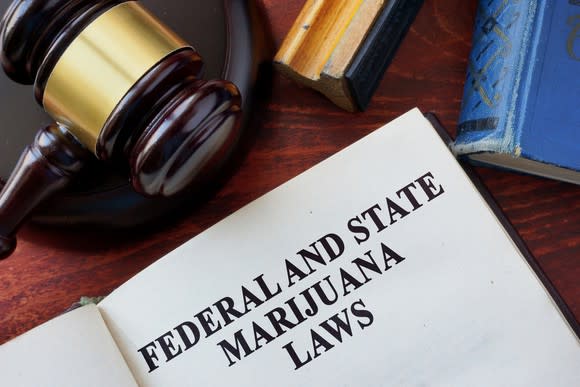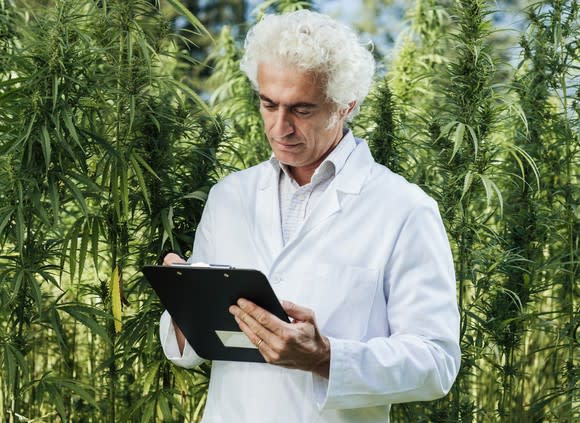The Senate Appropriation Committee's Must-See Quote on Marijuana's Scheduling
This has turned into another banner year for the legal marijuana industry. Following the legalization of medical cannabis in Mexico last year, Canada has made good on its pledge to legalize recreational marijuana. As the first industrialized nation to do so, adult-use sales will become officially legal on Oct. 17, 2018, according to Prime Minister Justin Trudeau.
This push to legalize shouldn't come as a surprise to anyone who's been keeping tabs on the public's sentiment toward marijuana. According to national pollster Gallup, favorability toward the idea of legalizing marijuana in the United States has improved from just 25% in 1995, during the height of the War on Drugs, to an all-time high of 64% as of October 2017. In fact, five national polls have all demonstrated similar favorability for legalization, with support ranging from 59% to 64%.

Image source: Getty Images.
Marijuana's scheduling in the U.S. is a logistical nightmare
However, unlike the Canadian and Mexican cannabis industries, the U.S. has been stuck in neutral. That's because the drug is classified as a Schedule I substance at the federal level. Placed alongside LSD and heroin as a Schedule I drug, cannabis is wholly illegal, considered to be highly prone to abuse, and isn't recognized as having any medical benefits.
Aside from simply being illegal, this Schedule I classification has some pretty big ramifications on businesses and medical patients. For example, a more than three-decade-old tax section known as 280E disallows businesses that sell a federally illegal substance from taking normal corporate income tax deductions. If profitable, it means cannabis-based businesses in the U.S. could be on the hook for an effective corporate income tax rate of between 70% and 90%.
Likewise, marijuana companies have little or no access to basic banking services. Even though the federal government has taken a hands-off approach with state-level legalizations -- to date, 30 states have given the green light to medical marijuana -- banks still fear the potential for monetary and/or criminal prosecution for providing banking services to the industry. Let's not forget that Attorney General Jeff Sessions has, on more than one occasion, shown a desire to halt the progression of legal cannabis by any means necessary.
Even patients could suffer because of this scheduling. There's only one approved marijuana grow facility in the U.S. (the University of Mississippi), and the procedural red tape involved in getting approval to run clinical trials is dramatically slowing the ability of researchers to determine what medical benefits cannabis might have.

Image source: GW Pharmaceuticals.
You won't believe what the Senate Appropriations Committee just said about marijuana
It's this latter disadvantage that's drawn the attention of the Senate Appropriations Committee. In a report released last week titled "Barriers to Research," the Committee said, courtesy of Forbes:
The Committee is concerned that restrictions associated with Schedule I of the Controlled Substances Act effectively limit the amount and type of research that can be conducted on certain Schedule I drugs, especially marijuana or its component chemicals and certain synthetic drugs... At a time when we need as much information as possible about these drugs, we should be lowering regulatory and other barriers to conducting this research.
The panel is directing the National Institute on Drug Abuse to provide a report that details the barriers researchers are facing in analyzing the risk-versus-benefit profile, which lawmakers have so often called for.
This call to action also comes at a time when the U.S. Food and Drug Administration (FDA) approved its first-ever cannabis-derived drug. On June 25, GW Pharmaceuticals (NASDAQ: GWPH) announced that its lead, cannabidiol (CBD)-based, oral drug Epidiolex had been given the thumbs-up from the FDA to treat two rare types of childhood-onset epilepsy. In particular, GW Pharmaceuticals' Epidiolex led to statistically significant reductions in seizure frequency from baseline, relative to the placebo, in patients with Dravet syndrome and Lennox-Gastaut syndrome. This approval for GW Pharmaceuticals is in direct conflict with the definition of a Schedule I drug, which is a substance with no recognized medical benefits.
It would appear there's ample momentum to push for rescheduling at the federal level... but not so fast.

Image source: Getty Images.
This is a two-sided argument
Though the Senate Appropriations Committee has been critical of researchers' ability to run tests, it's also taken a pretty hardline stance on cannabis in other respects. For example, the Committee recently blocked a proposal that would have allowed banks to work with cannabis businesses without the fear of federal prosecution or monetary penalties.
What's more, the Committee has been downright negative on anything having to do with recreational weed and recent adult-use legalizations by nine states since November 2012. In the same report that it directs the National Institute on Drug Abuse to provide details about existing barriers to medical research, it also directs the National Institutes of Health (NIH) to examine the impact of recreational pot on brain development. As noted in the report:
The Committee is concerned with the rapidly changing landscape regarding the recreational use of marijuana -- the effects that the drug can have on brain development; addiction; the long-term health effects in both youth and older individuals. The Committee directs NIH to coordinate a multi-Institute approach to increase research related to the effect of increasing delta-9-tetrahydrocannabinol (THC) levels on the human body as well as the effect of various delta-tetrahydrocannabinol levels on cognitive abilities that are required to, for example, operate motor vehicles.
The Committee would also like to see expanded testing on cannabis confiscated by federal agencies. Doing so would help researchers get a better bead on the marijuana grown and sold today in order to understand substance misuse and to improve addiction prevention efforts.

Image source: Getty Images.
And one more thing...
As you can see, this is far from a cut-and-dried topic, according to the Senate Appropriations Committee. However, what's also being overlooked is that rescheduling of cannabis to allow researchers more leniency in conducting trials could actually be worse for the industry, as a whole.
If marijuana were rescheduled at the federal level to a Schedule II substance, it would still be prone to abuse, but would also be recognized as having medical benefits. Unfortunately, this most stringent classification for a legal substance could allow the FDA to tightly regulate the industry, which could cause headaches. The FDA would be responsible for overseeing and approving marketing and packaging, as well as testing crops to ensure that THC and CBD levels are consistent from one crop to the next.
The bigger issue is that the FDA could also require marijuana-based businesses to run approved and FDA-overseen clinical trials to prove that cannabis aids specific ailments. In other words, if the claim has been made that cannabis helps patients with glaucoma, then medical marijuana growers may need to run clinical studies demonstrating this to be the case before the FDA will allow it to be approved for patients with glaucoma. Essentially, moving to Schedule II could be an even bigger nightmare for medical patients and the legal cannabis industry than its Schedule I classification.
Clearly, there's a lot to be hashed out with legal marijuana in the United States, and it's not going to happen overnight. But with favorability toward legalization increasing almost every year, the call to action is definitely getting louder.
More From The Motley Fool
Sean Williams has no position in any of the stocks mentioned. The Motley Fool has no position in any of the stocks mentioned. The Motley Fool has a disclosure policy.

 Yahoo Finance
Yahoo Finance 